 |
Home | Search | Browse | About IPO | Staff | Links |
 |
Home | Search | Browse | About IPO | Staff | Links |
Sixty Illinois corporations and not-for-profit organizations were recently recognized and honored as Centennial Businesses by the Illinois State Historical Society. The occasion was the 19th annual Centennial Awards banquet, held October 10 at the Palmer House Hilton in Chicago. In addition to the business awards, Illinois author Studs Terkel received the Society's Lifetime Achievement Award, the Chicago Symphony Orchestra took home the Artistic Achievement Award, and the Chicago Association of Realtors received the 2003 Distinguished Service Award. The 60 new Centennial Awards winners join more than 1,100 previous businesses and not-for-profit organizations that have been recognized since the program's inception in 1984. Past recipients include the Chicago White Sox, Augustana College, the Walgreen Company, St. Francis Hospital, the Illinois Press Association, and the Quincy Public Library. The banquet was held in the Empire Room of the Palmer House, followed by a performance by the world-renowned French Horn Trio of the Chicago Symphony Orchestra. The elegant, three-course dinner consisted of petite filet mignon with wild mushroom sauce and grilled boneless breast of chicken in chutney sauce, served with fresh hand-selected field greens, asparagus risotto, zucchini cups with squash mousse, fresh string beans, and red roasted pepper. This year, in addition to the Centennial Awards, the Society established the Jack Brickhouse Award for Communications Excellence, and presented it to two Chicago media personalities: Chicago radio announcer Jack Taylor; and Pat Brickhouse, widow of Baseball Hall of Fame Announcer Jack Brickhouse. Both Mr. Taylor and Ms. Brickhouse were instrumental in establishing and promoting the Centennial Awards program. For more information about the Centennial Awards program, call 217-525-2781. Illinois Heritage 9 A listing of the 2003 Centennial Award winners:
Alliance Francaise de Chicago, Chicago: 1897
10 Illinois Heritage
Illinois Heritage 11 CENTENNIAL HISTORIES Of the more than sixty Centennial Award-winners recognized this year, only about half were able to attend the banquet at the Palmer House Hilton in Chicago. Following are the histories of those corporations represented at the banquet. Subsequent issues of Illinois Heritage will spotlight the 2003 Centennial businesses not profiled here. For more coverage of the 2003 Centennial Awards Banquet and program, please visit the Society's website at www.historyillinois.org Viva la France. Founded in 1897 and incorporated under the laws of Illinois on September 6, 1901, Alliance Francaise de Chicago is an educational and civic organization dedicated to promoting the study of French culture, language, history, literature, and philosophy. The Alliance merged with the French House of Chicago in 1980, and today operates from offices at 810 N. Dearborn Avenue. Accepting for Alliance Francaise de Chicago was resource director Renee Saito.  The Aurora Turners -- fraternal organization promoting physical fitness and cultural activities—was established in 1858 by German residents of that city. Reorganized in 1873 and chartered by the state in 1907, the Aurora Turners joined the American Turners that same year. Gymnastics, basketball, volleyball, tennis, golf, track and field, swimming and bowling have been part of the Turner regimen, available to active people of all ages. The motto of the Turners, "A sound mind in a sound body, continues to inspire and promote healthy lifestyles throughout Aurora. Accepting for the Aurora Turners was chapter historian Edwin E. Colton. The Blacker Farm Company of White Heath, was established in the fall of 1902. Founder Frank D. Blacker purchased two significant land tracks in Piatt County, upon which he built a substantial grain farm. 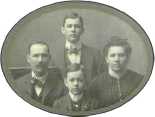 The farm was incorporated by the State of Illinois in 1902, and has been passed down from generation to generation, to present-day owner Stan Blacker. The principal crop is an Illinois icon: Corn. Accepting for Blacker Farm Company were owners Stan and Brenda Blacker. 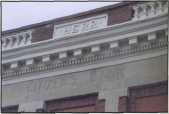
The Citizens Bank of Chatsworth was chartered in December 1903 and opened for business on January 1, 1904. Retired farmer Stephen Herr I was sole owner of the bank during the early years and passed the business on to his four sons, Frank, Ed, Stephen II, and Jesse. The banks primary business has been serving farmers, small businesses, and local families, with an emphasis on senior citizens. Thomas E. Herr, present CEO and the fourth generation bank manager, accepted the award on behalf of the Citizens Bank of Chatsworth. Chartered on February 4, 1903, Fairfield National Bank began with a capital investment of $60,000. Today its assets total more than $2.42 million. Located at 102 N. Main Street in the heart of downtown Fairfield, the bank served its community in the same location for nearly century, and its original 2 1/2 story brick and limestone building continues to anchor the Fairfield skyline. In 1971, a modern banking home was constructed, which continues to serve the community's varied banking needs. Accepting for Fairfield National Bank was president Larry Rost. 12 Illinois Heritage 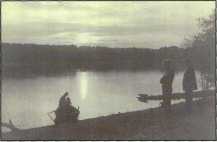 Frentress Lake Properties, a Limited Liability Corporation, was established in East Dubuque as an Illinois resort business between 1900 and 1902. The 54-acre site was founded by Charles Heller, who began building rental cottages on the property in 1903. Although the property changed hands over its century of operation, the business has remained in the same family throughout its history. Today the resort is operated by Anise Bonnet and Amy Thurston, who accepted the award. Glenwood School opened its doors on February 7, 1887 as the Illinois Industrial Training School for Boys. Its mandate was to be a home and school for abandoned children. Originally located in Norwood Park, the not-for-profit school moved to Glenwood and in 1994 opened a school in St. Charles, expanding its mission to provide a residential and educational program for disadvantaged children throughout the Chicago area. This past summer Glenwood School opened its first cottage for girls, a new, bright beginning for a venerable institution. The Henry Pratt Company of Aurora began operations in 1901 as the Henry Pratt Boiler and Machine Company. In the early years, the company was known for its ability to make or repair anything— from smoke stacks, boilers, and tanks to steam ships. In the 1920s and 1930s, Pratt designers developed the resilient seated butterfly valve and became a market leader in the power and waterworks industries. Today the company employs 500 people in Aurora, Dixon, and Hammond, Indiana. Accepting for the Henry Pratt Company was Administrative Assistant Maria V. Coyne.
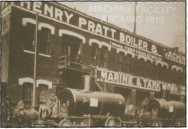
Homewood Memorial Gardens was officially incorporated as a cemetery association in 1892, but burials on the grounds date back to the 1850s. Situated between Thorton and Homewood in Cook County, Homewood Memorial Gardens was first used by the Reform Church of South Holland. Adjacent to it was the Oak Ridge Cemetery, which later expanded as Oak Lawn Cemetery. The rolling, 43-acre burial ground sits atop an ancient coral reef amidst hundreds of beautiful oak trees. Significant burials include many early pioneer setters of south suburban Chicago, the Gottschalk family, and August Mueller, the Thomas Edison of roller coasters. Owner Thomas Flynn accepted the award for Homewood Memorial Gardens, Incorporated. The Illinois Rural Letter Carriers' Association was organized in Belvidere in 1903. That September, the National Association of Rural Letter Carriers met for the first time. Only 15 states attended the national convention in Chicago, and of the 52 delegates, 25 percent represented the Prairie State. In those days the salary of a rural letter carrier was about $300 per year; the mail, delivered by horse and buggy, came through regardless of the weather. The pay has improved significantly, the transportation system is the best in the world, and rural delivery is still free throughout the nation. There are few success stories with so many winners. Accepting for the Illinois Rural Letter Carriers'Association was President Sabra Moore. Illinois Heritage | 13 John Griffith was born in North Wales in 1865 and came to Chicago in 1888, In 1903, after working in the coal business for several years, he launched a real estate business in Lake Forest. A specialist in estate culture, Mr, Griffith was a seminal figure of his day; by the 1920s his developments stretched across the Des Plaines River valley and as far north as Libertyville. With offices in the historic Market Square, the firm today continues to play a significant role in the development ol the Lake Forest community. The company is owned and managed by Mr. Griffith's descendant, Brad W. Andersen, who accepted the award for Griffith, Grant, & Lackie Realtors. The Alpha Club of Libertyville first met in April 1903 in the home of Daisy Lger Morse. Its objective was "the intellectual improvement of its members and a united effort toward social and civic advancement." Its motto was and remains "Unity in Diversity." In 1917, the group allied itself with the Illinois State Federation of Women's Clubs and the next year changed its name to the Libertyville Woman's Club. Always an active supporter of charitable causes and scholarship programs, the Club founded the first public library in Libertyville in 1921. The Libertyville Woman's Club still meets monthly from October to May. Accepting the Centennial Award was Marjorie Clacking. The Logan County Title Company began doing business in Lincoln, Illinois, on July 1, 1903. Founder Lynn H. Parker moved his offices to 507 Pulaski Street in 1910 and bought the building nine years later. The company incorporated under the laws of Illinois on December 20, 1930. Mr. Parker retired in 1953 but remained president of the corporation until his death in 1969. His son, David Brewster Parker, succeeded him and was president until his death in 1994. Today, Parker's widow, Joan A. Parker, is president, and the founders'grandsons, Jonathan and Christopher Parker, serve as directors. Accepting for the Logan County Title Company was President Joan Parker. The Lucretia Leffingwell Chapter of the Daughters of the American Revolution was established in Knoxville, Illinois, on June 3, 1903. Miss Fmma Pease Howard, principal of St. Mary's School for Girls, was the organizing regent. Now headquartered in Galesburg, this active organization still meets regularly in the homes of its members and for public events, promoting historic, patriotic, and educational themes while emphasizing God, home, and country. Accepting for the Lucretia Leffingwell Chapter of the Daughters of the American Revolution was Dr. Irene Caruso, regent.
The Mid-Day Club of Chicago received its charter as a private dining club on May 21, 1903. Here the most respected names in the Chicago business community wined and dined each other on corn-beef hash, clam juice cocktails, blood-rare sirloin sandwiches, and other culinary staples of the day. Club meals were served in the First National Bank Building at 21 South Clark Street. That address is now Bank One Plaza, on the 56 floor. The menu has also changed, but the century-old tradition ot excellent food and exceptional fellowship continues. Accepting for the Mid-Day Club of Chicago was club manager Timothy Hauschildt. SBC first connected in Illinois on ]une 26, 1878, as the Chicago Telephone Exchange. On January 14, 1881, the corporation merged with the Chicago Telephone Company and two years later with the Central Union Telephone Company. In 1920, Central Union merged to create Illinois Bell Telephone Company, which became Ameritech Corporation in 1991. Light years later Ameritech merged with SBC, and last year SBC Illinois joined the party. Accepting the award for SBC's 125 years of excellence in communications services was Sam Balark. 14 Illinois Heritage CENTENNIAL HISTORIES
St. Joseph's Home for the Aged was established on October 6, 1903, by the Sisters of St. Francis. With a bequest of $17,000 from the Bishop of Alton, the sisters purchased the Wabash Hospital in Springfield and opened their home for the "sheltering and comfort of aged people." In 1926, St. Joseph's moved from downtown Springfield to spacious new home on the city's southside. Today St. Joseph's Home of Springfield and the Sisters of St. Francis continue to offer quality, loving, long-term care for the elderly. Accepting for St. Joseph's Home of Springfield was Development Director Terri Hempstead. Shimer College, founded as Mt. Carroll Seminary on May 11, 1853, is a four-year liberal arts college originally located in Mt. Carroll, Illinois. The founders, Cinderella Gregory and Frances Wood Shimer, opened the doors to 11 students that term, and closed with 40. The institution was renamed the Frances Shimer Junior College and Preparatory School in 1910, and shortened to Shimer College in 1950 when it became a Great Books college. In 1979, the college moved to Waukegan, where this year it celebrates its 150th anniversary. Accepting for Shimer College was Barbara S. Stone, Director of Development and Public Relations. Rudolf Adam opened his Village Barbershop in Matteson in 1896. By 1919, business was so brisk he hired an assistant and doubled his prices: $.40 for a haircut, $.20 for a shave. Storytelling was a staple at the barbershop; a good story was often rewarded with a free shave. In the 1940s, Mr. Adam, (now Adams) added his son's name to the shingle. Although both father and son have long since passed, the Village Barbershop is still owned by the Adams family, and a good story is very much appreciated. Accepting for the Village Barbershop was owner Lucille Adams Walker. On June 1903, the King's Daughters Union of Moline, a charitable service organization, established the first Visiting Nurse Association in western Illinois. Miss Augusta Jones, its first employee, was hired and sent to Chicago for two months of training. Her salary was $50 a month, with a $50 outdoor clothing allowance. She traveled by horse and buggy to attend her patients. Today the Visiting Nurse and Homemaker Association of Western Illinois, with offices in Rock Island, is an essential home health care agency serving the Quad Cities and surrounding communities. Accepting for the Visiting Nurse and Homemaker Association of Western Illinois was Gary Bargstadt, president. The Spengel-Boulanger Funeral Home, Inc., of Highland, began in August 1902, as a sideline to August Spengel's Highland House Furnishing Company. Mr. Spengler's primary business was selling furniture and appliances,with "undertaking a speciality." His son, Raymond, and later grandson, Robert, continued the business, acquiring the Boulanger Funeral Home in 1959, whereupon the names were merged. Mr. Jay Boulanger purchased 50 percent of the stock in 1974 and incorporated the business in 1994. The business now operates in four locations: Highland, Marine, Alhambra, and Hamel. Accepting for the Spengel-Boulanger Funeral Home was Jay W. Boulanger. Established in Freeport in 1853, the Wagner Companies is the oldest family-owned and operated printing company in the United States. In 1858, the company reported and printed the Lincoln-Douglas debates. During the Great Depression, Wagner Companies was one of a handful of American businesses run by women. In the 1970s, led by 5 generation owner Mark Wagner, the business expanded into Rockford and Chicago. Today The Wagner Companies include three divisions: Wagner Printer, Infocomm Print, and Jade Creative, a print and design business. Accepting for the Wagner Companies was sixth generation Wagnerian, Willie Wagner, founder of InfoComm Prepress and Print. Illinois Heritage 15 In 1984, the first year the Illinois State Historical Society honored Centennial businesses in the state, The Weber Funeral Home of Chillicothe was inducted. At that time the business was 131 years old, still in the Weber family, and the oldest continuously operating business in Peoria County. Founded in 1852 by Andrew Weber, a German cabinetmaker who also made his living as an undertaker, the home was operated by four generations of Webers until it was sold to Gregory and Margaret Hurd in 2002. The business operates out of a century old-mansion. Accepting for the Weber-Hurd Funeral Home were Gregory and Margaret Hurd. The 1903 Chicago City Directory records that August Weidenmueller ran an engraving shop out of his basement at 307 Naslund Place, now Pensacola Avenue. As a hand die engraver, Mr. Weidenmueller specialized in embossing dies, bottling labels, and printing. His handiwork was noticed by the National Biscuit Company— Nabisco, which hired him to engrave the first set of biscuit-forming dies. The rest is cookie history. One-hundred years later the Weidenmiller Company is still making dies for the cookie industry, and much more. The company has since moved to Itasca, but is still 100 percent family owned. Accepting for Weidenmiller Company, Inc. was Thomas W Weidenmiller, Sr. Chairman of the Board. A. H. Wendt opened his furniture store in Port Byron in 1866. In addition to selling parlor and bedroom suites, he carried a complete line of funeral supplies, from shrouds and coffins to roses and caskets, and drove the finest hearse in the county. Both businesses prospered and he built a substantial two-story brick store and showroom, the pride of Scott and Rock Island counties. When he died, his family carried on the business, eventually moving it to East Moline and later Moline. Although the Wendt family is now out of the furniture business, the Wendt Funeral Home ably carries on the work of its resourceful founder. Accepting for Wendt Funeral Home were fifth generation owner Earl Wendt III and his wife, Coralie. 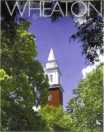
Wheaton College received its charter as a Christian Liberal Arts College on February 28, 1860, yet its history dates from 1851 and the founding of the Illinois Institute in Longtown, Illinois. Established by abolitionists of the Wesleyan and Congregationalist churches, Illinois Institute became Wheaton College in honor of Warren L. Wheaton, who donated 50 acres of land to the school. The colleges strong focus on evangelism and missions has brought it international recognition, and its graduates continue to spread hope and light throughout the world. Accepting for Wheaton College was Professor Thomas Kay. 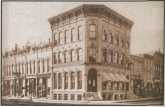
Henry W Williams was sole proprietor of his Rockford-based insurance company when he opened the doors in 1896. Dwight Manny became a partner in 1913 and the business continued to grow and prosper through the war years and Great Depression. Though there have been other business partners, Williams-Manny Inc. became the insurance agency's official name in 1968. One of the oldest and most respected full-service, independent insurance agencies in northern Illinois, Williams-Manny Inc. today offers flexible, cost-effective insurance protection for individuals and companies of all sizes. Accepting for Williams-Manny Inc. was administrative assistant Patricia Earnhart. The Woman's Athletic Club of Chicago was incorporated on September 13, 1898. Conceived as a "temple of physical culture' for the women of Chicago, its founders included visionaries Paulina H. Lyon, Medora Thompson, and philanthropist Belle Armour. In 1928, this private club moved to its present-day Michigan Avenue address, and during World War II, flew the flag of the American Red Cross. Now into its second century, the Woman's Athletic Club of Chicago continues to be an oasis of hope and a beacon of light in the heart of the city. Accepting for the Woman's Athletic Club of Chicago were Cricket Trutter and Donna Heroy. 16 Illinois Heritage |
|
|